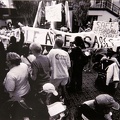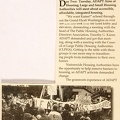[Headline] "No More Excuses!" The ADAPT Fall Action in Washington, DC September 11-16, 2006, By Tim Wheat
Day One: Monday, ADAPT arrived in the Nation's Capitol to demand action not explanations.
"No More Excuses!" was the message that hundreds of activists from across the nation brought to the nation's capital. ADAPT was in Washington to remind the Congress, the Administration and the states that Americans prefer living in the community and expect action, not excuses. The message: End the institutional bias, gain equality in housing and continue to have a choice in health care services.
The continuing focus of ADAPT is to destroy the barriers that keep people with disabilities in nursing homes and other institutions. Likewise, ADAPT is working to keep older Americans and persons with disabilities in their own homes with the services and supports they need. The lack
[image]
[image caption] Photo by Toni Olin
[text continues] of affordable, accessible, integrated housing, the lack of personal assistance pro-grams in all states, and the movement to integrate long-term care services and supports into state acute health care managed care plans are the specific obstacles that ADAPT is working to overcome.
Day Two: Tuesday, ADAPT Aims at Housing; Large and Small Housing Authorities will meet about accessible, affordable, integrated housing. "We want Kaiser!" echoed through-out the Grand Hyatt Washington as over 400 activists took over the hotel lobby and elevators, demanding a meeting with the head of The Public Housing Authorities Directors Association, Timothy G. Kaiser. ADAPT demanded and got that meet-ing, along with a meeting with the Council of Large Public Housing Authorities (CLPHA). Getting to the table with these groups is one more step to transition-ing people from institutions to their own homes.
Nationwide Housing Authorities have the opportunity to help remove barriers to housing, so ADAPT activists demanded change.
The grassroots experience of ADAPT
[image]
[image caption] Photo by Tom Olin
[text continues] - actually working to help people to get out of nursing homes - points to answering the simple question of "where will you live?" ADAPT's proposal, Access Across America, is a direct answer to that question and a liberating call for our social policy to correct the isolation and confinement of people with disabilities.
Early in the morning, ADAPT members were involved in training sessions at the Holiday ball Capitol ("the ADAPT Hotel"), then they gathered to leave before 10 AM. The group chanted as the long line of 500 activists snaked across the mall and into the business district. As the main body of the group turned east on "E" street, about 50 people suddenly broke off and headed west.
"As we move out of nursing homes and other institutions, we need affordable, accessible, integrated housing to move into," said Cassie James, Philadelphia ADAPT Organizer. "An obvious place to start is with the nation's Public Housing Authorities. The PHAs have the ability to designate Section 8 housing vouchers specifically for use by people leaving nursing homes and institutions who are receiving home and community based services. We need to make sure the PHAs do just that - No More Excuses!"
The larger group targeted the Legislative Affairs Convention of the Public Housing Authorities Directors Association (PHADA), held at the Hyatt Regency Capitol Hill. PHADA represents the professional. administrators of the country's approximately 1,900 housing authorities. Those housing authorities have the ability to link housing vouchers with Medicaid-eligible people transitioning to the community from shelters, nursing homes and other institutions. ADAPT insisted that PHADA endorse Access Across America to assist people with disabilities moving out of institutions, to increase the supply of accessible units and to make modifications to
inaccessible units.
The line of ADAPTers turned off the street and into the underground parking garage of the Hyatt. From there, the hundreds of activists strolled into the hotel and packed the lobby, chanting, "We want Kaiser! We want Kaiser!"
Other activists put up signs on the stairs and landings of the posh lobby, while anxious Hyatt staff worked to take down signs. ADAPT members unfurled a long banner that read: Affordable, accessible, integrated housing. The banner was so long, activists had to weave it through the crowd and wind it around the escalator. Metro Police stepped in to negotiate with PHADA, and before noon Timothy G. Kaiser and Policy Analyst Jim Armstrong of PHADA agreed to hold a September 25 meeting with ADAPT.
Just before news of the victory with PHADA was announced, word spread that the team at CLPHA would be arrested. The smaller ADAPT group had success-fully made it to the ninth floor offices and packed the hall from one end to the other.
"The staff there at CLPHA were not happy to see us," said Nancy Salandra of Philadelphia ADAPT. "They had an attitude and were lecturing us like they were the oppressed little guys and we were worse than the dirt on their shoes."
In true ADAPT fashion, when the office staff became a barrier, the negotiators flowed past the office employees "like water around a stone." CLPHA agents would not provide a, phone number for the director, but imaginative activists linked up with an individual in Kansas who was able to get the number of the administrative staff. ADAPT called CLPHA Board President, Sandra B. Henriquez, Administrator of the Boston Housing Author' t who agreed to an October 4 meeting with y, ADAPT.
At about 1:30 the two ADAPT groups
page 3
[text continues] linked up at the National Mall and headed back to the hotel.
"The power of ADAPT-I love it," said Rahnee Patrick of Chicago. "I love when we split up and have an extra surprise target."
Day Three: Wednesday, "We are not cash cows!" ADAPT's "No More Excuses" Campaign Spotlights Managed Care.
ADAPT took over the lobby of another hotel, demanding that national managed care groups meet with them and consider essential principles for people with disabilities. States may soon expand the sue of managed care as a tool to control costs, so ADAPT struck America's Health Insurance Plans (AHIP) to ensure that gains made over the past 30 years for people with disabilities are included in managed care plans for Medicaid long-term care.
Grassroots advocates are concerned that as states shift to more managed care, people with disabilities may lose many of the gains they have achieved. States have stalled in their implementation of the 1999 Olmstead decision that required services in the most integrated setting, and new MCO's may not see Olmstead as a priority.
[image]
[image caption] Individual in a cow costume stands with the crowd of protesters. Photo by Tom Olin
[text continues] ADAPT activists marched into the lobby of the Capital Hilton, where AHIP and the American Association of Health Plans (AHHP) were holding a conference. The staff at the Hilton hopelessly attempted to block the door, even after hundreds had packed into the lobby. The activists trickled past the constriction at the door and joined the mass of people chanting, "We are not your cash cows, meet with ADAPT now."
"That was amazing how we were all able to slip into hotel number two after yesterday's action," said Stephanie Thomas of Texas. "What a huge amount of noise we made. It was so loud that it was bizarre to be in that lobby when everyone had left. It was a stellar hit!"
Some ADAPTers dressed up as cows to emphasize the point that a move to managed care should not be an opportunity to make money off the backs of people with disabilities. Long-term care services are vital to many people living in the community and being part of American life. Changes to the program can devastate the civil rights of people with disabilities who don't want to be made the target of their insurance companies.
"This was my first action with ADAPT, and the lobby of the Hilton was something I've never seen before," said Toby Lusce of Topeka. "I usually just stay at home and don't do anything. But my friend Paul O'Dell said he knoews how to get me involved with something, and that was how I ended up here. I love this and I am going to get more involved."
Day Four: Thursday, Twice the Success; ADAPT wins a meeting with the RNC and concessions from HUD.
ADAPT's "No More Excuses" campaign continued its dazzling success Thursday with two traditionally stubborn organizations. ADAPT won a meeting with the chair-person of the Republican National Committee (RNC), and the Department of Housing and Urban Development (HUD) committed to write a letter to public housing authorities concerning a preference for housing subsidies for people with disabilities leaving institutions. The Democratic National Committee (DNC) had already signed on as a MiCASSA Supporter, but the RNC had not.
Thomas Josefiak of the RNC signed a letter committing Chairperson Ken Mehiman to a meeting with ADAPT. (Mehlman has since resigned.) ADAPT had success this legislative term with the passage of the federal Money Follows the Person, a bill that will help people avoid expensive and undesirable institutionalization. The RNC meeting with ADAPT will include ways this legislation can be implemented. Also on the agenda will be MiCASSA in 2007.
"We have not been able to get in the front door at the Republican National Committee for the last five years," said John Donnelly of New York. "We have been try-ing to make them talk about our issues, so it seems they have acquired some common sense. It would be wise for them to meet with us."
"It was unbelievable that it came so fast," said Daniese McMullen-Powell, about the negotiations with the RNC to-
[image]
[image caption] ADAPT outside RNC. Photo by Tim Wheat
[image]
[image caption] ADAPT outside HUD. Photo by Torn Olin
[text continues] day. "I didn't expect them to agree to our demands so quickly. But now we have a meeting with Ken Mehlman after the election and before the end of the year."
ADAPT activists also have a long his-tory of direct action with HUD, and with the renewed initiative started with the public housing authorities, ADAPT had to act to get the Department's cooperation. A year ago, ADAPT, through direct action, was able to begin a positive dialogue with Secretary Alphonso Jackson, but progress had slowed.
- Created on
- Tuesday 23 July 2013
- Posted on
- Thursday 10 December 2020
- Visits
- 269
- Rating score
- no rate
- Rate this photo


0 comments